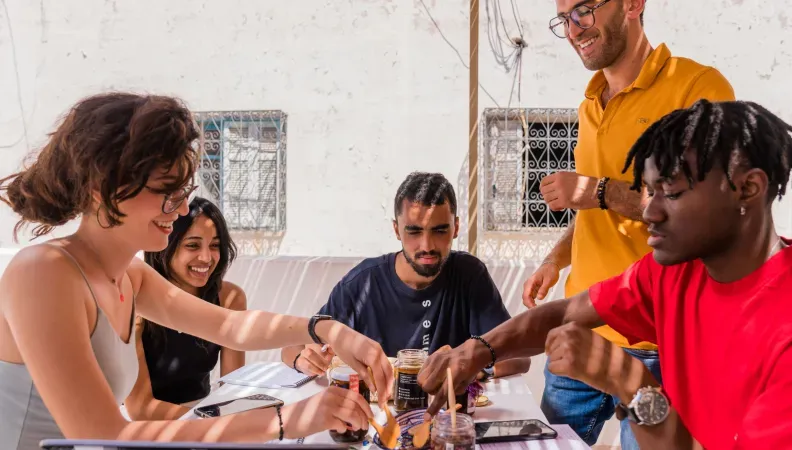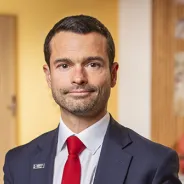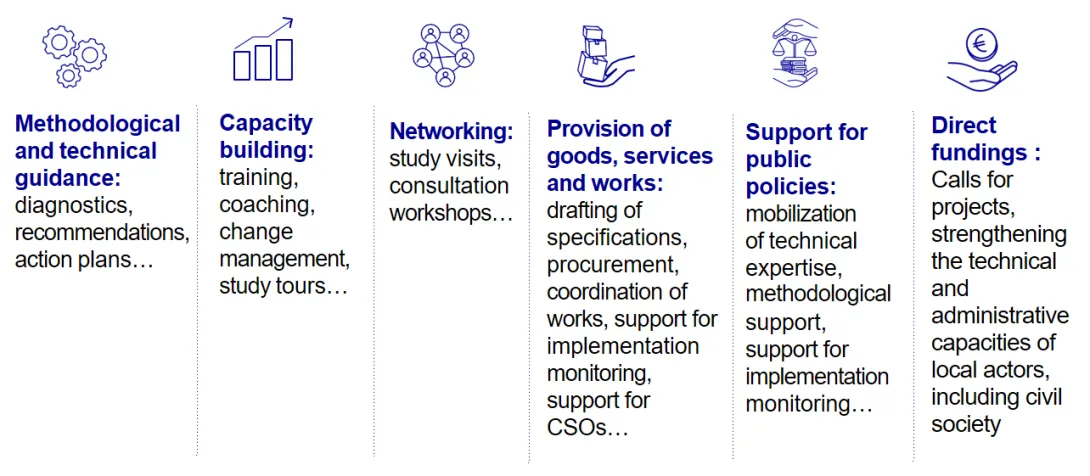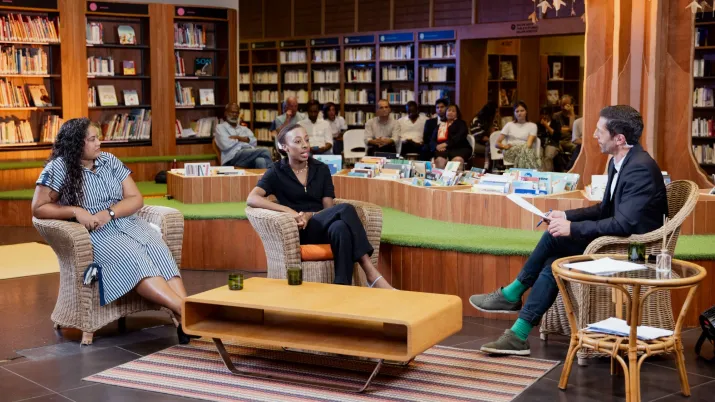Share the page
Our work in international development

Major progress has been made over the past decades in reducing poverty, improving access to health and education, and promoting gender equality. Yet significant inequalities persist, worsened by climate change, health crises and the emergence of new conflicts.
In this context, public policies have a key role to play in establishing a favourable environment for sustainable development and inequality reduction.
As France’s public agency for development cooperation, Expertise France goes beyond what is traditionally known as official development assistance (ODA). It promotes a policy of international partnerships rooted in sustainable and inclusive investment. These partnerships take into account the needs and priorities of our partner countries and organisations to help them achieve sustainable global development.
We design and implement projects that durably strengthen our partner countries’ public policies. We operate in traditional development sectors such as governance, security, climate, health, and education, as well as in emerging fields like digital innovation and culture. Through these actions, we support our partners in achieving the Sustainable Development Goals (SDGs).
French development aid
English
How we envision international partnerships?
International partnerships are part of the inclusive and sustainable investment policy (also known as “official development assistance” or “ODA”). They encompass all actions and financial support provided by public bodies in member countries of the Development Assistance Committee (DAC) to recipient countries. These recipient countries are listed by the Organisation for Economic Co-operation and Development (OECD). In 2024, global development aid amounted to $212 billion.
French policy on international partnerships is defined by the Presidential Council for International Partnerships and the Interministerial Committee for International Cooperation and Development (CICID). Since its creation in 2015, Expertise France – the French interministerial agency and the second-largest development cooperation agency in Europe – has helped reshape, renew and strengthen France’s approach to international development cooperation. Acting as a coordinator of technical expertise, it supports French ministries and works closely with international partners.
"Our support is increasingly multidimensional. We can intersect thematic areas and strengthen public policies in all their dimensions: financial, social, sustainable development, etc. That is the advantage of having an interministerial agency that is now four times bigger than it was ten years ago."
- CEO of Expertise France

Our expertise in international development cooperation
Development cooperation is a key component of international partnerships. It aims to:
- Promote sustainable and inclusive development
- Strengthen partner countries and institutions
- Support the transformation of organisations and upskilling of personnel
This cooperation may be short- or long-term. It involves the implementation of projects that promote capacity building, knowledge transfer and skills sharing. It also involves change management, whether change is due to economic disruption, climate disasters, pandemics, state reforms, political instability, armed conflict, risk prevention, etc.
Within each technical cooperation project, Expertise France provides advice and support to central governments, regional bodies, local authorities, or civil society organisations. We work with these partners from needs appraisal to impact assessment.

How our agency serves the SDGs
The SDGs are 17 global goals adopted by United Nations (UN) member states in September 2015. The 2030 Agenda outlines 169 targets within these 17 goals to be reached by 2030 that are common to all signatory countries. They aim to:
- Eradicate all forms of poverty everywhere
- Protect the planet
- Ensure prosperity for all
As France’s agency for development cooperation, we serve French and shared international interests in health, security, sustainable development, and inclusivity. Everyday, we work to promote and achieve the SDGs by focusing on the following strategic priorities:
- People: Combat poverty and pandemics, strengthen healthcare systems and social protection, promote gender equality, education, higher education, and training.
- Planet: Protect the planet by supporting climate change mitigation and adaptation, protecting biodiversity, and fighting pollution.
- Prosperity: Support economic and social development, promote entrepreneurship, analyse business environments, and provide guidance on the efficient use of domestic resources.
- Peace: Strengthen and promote democratic, economic, and financial governance, human rights, the rule of law and democratic dialogue, crisis prevention and management, and post-conflict recovery.
What role does Expertise France play in global development aid?
As a key player in France’s international partnership policy and its sustainable and inclusive investment strategy, we act both as an interministerial development cooperation agency and a subsidiary of the AFD Group. Our role is to provide efficient, coherent, collaborative solutions in line with French and European priorities.
We enable experience sharing, capacity building, peer learning, knowledge transfer, and co-development of solutions through the sharing of expertise and good practices with partner countries. The end-goal is to develop solutions tailored to local needs.
384 Over 384 active projects in nearly 150 countries, with more than 135,000 days of expertise deployed annually.
Our work includes project implementation and a growing deployment of experts in priority sectors and regions for France and the European Union. We specialise in designing tailor-made projects that directly address the specific needs of each partner to ensure sustainable, long-term benefits.
A broad range of services tailored to local needs
People are the focus of our international development cooperation and expertise. This human-centred vision is implemented through a range of services that deliver the resources inhabitants of partner countries need to achieve sustainable development.
We continuously refine these services, which include methodological and technical advice, capacity building, networking, and the supply of goods, services, and infrastructure.

FAQ: More about development aid
Find out more about development aid below.
An inclusive and sustainable investment policy, also known as “official development assistance” or “ODA”, refers to the financial, material, and human resources transferred from developed countries (or international institutions) to developing countries. These resources support economic, social and institutional growth.
ODA can take the form of grants, loans and technical cooperation. It can also involve support for specific projects in education, health, infrastructure, and other sectors. ODA adheres to the principles laid down by the Development Assistance Committee (DAC) of the Organisation for Economic Co-operation and Development (OECD).
ODA may be bilateral (directly from the donor to the recipient country) or multilateral (via international organisations such as the World Bank or UN agencies). Its goals include poverty reduction, sustainable development, democratic governance, and humanitarian emergency response.
Since the adoption of the Millennium Development Goals (MDGs) and Sustainable Development Goals (SDGs), ODA has also addressed cross-cutting themes such as gender equality, climate change, and the strengthening of institutions.
The Development Assistance Committee (DAC) of the Organisation for Economic Co-operation and Development (OECD) determines and updates the list of countries and territories that are eligible for official development assistance (ODA). It does so based on gross national income (GNI) per capita. This classifies countries into the following categories:
- Least Developed Countries (LDC): these countries have the lowest rates of human development.
- Lower Middle-Income Countries (LM): GNI per capita between $1,136 and $4,465.
- Upper Middle-Income Countries (UM): GNI per capita between $4,466 and $13,845.
The full list of ODA recipients is available on the OECD website. While Expertise France primarily works with emerging countries, its actions are not limited to countries on the DAC list. Expertise France is currently present and active in nearly 150 countries around the world.
In 2024, global official development assistance (ODA) reached $212.1 billion, representing 0.33% of Development Assistance Committee countries’ combined gross national income. This figure is down 7.1% from 2023 , the first decline in five years.
The top donor countries by ODA volume in 2024 included the United States, Germany, the United Kingdom, Japan and France. ODA allocations vary annually based on geopolitical priorities, humanitarian emergencies, and bilateral or multilateral agreements.
Of the top ODA recipients in 2024, Ukraine received around $15.5 billion in aid (representing 7.4% of total net ODA), while African countries received approximately $42 billion, of which $36 billion went to Sub-Saharan countries.
For detailed and up-to-date data on ODA allocations by donor and recipient countries, refer to the OECD statistics portal. This portal releases ODA statistics and reports on a regular basis.
Our roundtable discussions
The Rendez-vous de l'Expertise
Les Rendez-vous de l'Expertise, an original format of interactive conferences lasting 1h30, are designed as genuine live broadcasts. Each session explores a key theme in international development thro...
Key figures
- 991 organisations received capacity building training in sustainable development
- 11767 staff received training on health service delivery
- 143 organisations received support in business development
- 550k individuals received training or targeted information about reducing gender inequality

